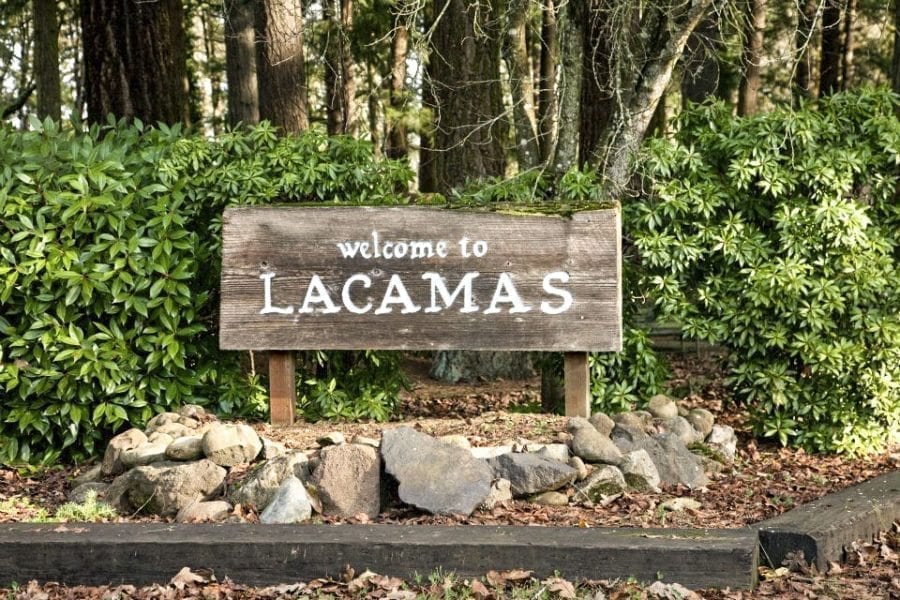CAMAS — A yearlong disagreement over what constitutes the “true value” of undeveloped land near Lacamas Creek came to a head this month after the Camas City Council voted to move forward with condemnation.
On one side of the disagreement is the city of Camas, which is trying to keep on schedule with a sewer project that will connect to Lacamas North Shore, a 460-acre development has the potential to add thousands of new jobs and residents to the small east Clark County city. On the other, a 40-acre Christian retreat that has served regional churches and community groups for more than 75 years.
“It’s been frustrating for us and the discussions went way beyond the value of the easement,” says Ben Culley, executive director of Camp Lacamas, the Christian retreat and conference center located off Northeast Goodwin Road. The Lacamas Creek Communities Board of Directors oversees the camp and the nonprofit owns 40 acres of land in Camas, including 18 developed acres where the retreat and convention center are located and 22 acres of undeveloped land that is in the path of the city’s new North Shore sewer line.
When the city first approached Culley and the board with its plan to place the sewer line on part of the Lacamas Creek Communities (LCC) property, the nonprofit leaders didn’t have a problem with the sewer line cutting through the area.
“We agreed on the principal of the thing,” Culley says. “But we disagreed on how they were going about it.”

“It’s just very frustrating”
Culley says the city, as well as other governmental bodies like Clark County have approached the nonprofit in the past with requests for easements and other bits of land that would suit their public projects.
“They’ve approached for different reasons, but they all wanted the land really bad, but also told us it was worthless,” Culley says. “In this case, the city desperately needs the land. There are hundreds of homes being built kitty-corner to our land and they need to put that sewer line in, so obviously the land isn’t worthless.”

Camas Utilities Manager Sam Adams says the city offered to pay for Culley and the board members to find their own licensed appraiser to get a true value for the land easements, but that the LCC landowners did not agree to that proposal.
“During my discussions with Ben (Culley) and his brother Carl, over the past year, we have offered to have them go get their own appraisal with a licensed appraiser in Washington, but they refused that,” Adams says. “We offered to have environmental folks go down there and talk to them about the land conditions, but they didn’t want that either.”
Culley contends that the LCC property owners did try to come to a reasonable agreement with the city.
“We told the city we would be happy to give them the easement, but we wanted them to put a tank in to replace the three older septic systems on our camp side and to pipe into the sewer system,” Culley says. “They’re saving money on this project … and every single one of those homes out there is tax revenue for the city. The whole development will generate tax revenues. But they told us that spending $70,000 on hooking us up to the sewer was too much. It’s just very frustrating.”
Adams says city staff did consider hooking up the campsite in exchange for the easements — a 17,823-square-foot permanent easement for the sewer line and a 21,831-square-foot temporary easement for construction — and brought a contractor to the site to see how much it might cost.
“We looked at sewering the entire camp, but weren’t able to do that, so then we looked at providing sewer to the buildings, the main gym/shower area and the house in back,” Adams says. “Just for the contractor, for those buildings, it would have cost $30,000. But that was unacceptable to (Culley). He wanted to sewer the entire camp.”
Providing sewer to the whole camp would have climbed to about $100,000, Adams says. And that amount, considering that the appraisal for the easements came in around $5,300, was simply too much for the city to consider.
“That would be a gift of public funds and we can’t do that,” Adams says. “We’ve tried to talk to them (the property owners) about this. The think the property value is much higher than it is. The area is mostly wetlands and it’s highly encumbered with creek buffers and critical habitat areas. It would be very challenging to develop that side of the property.”

Next step: Condemnation
Culley says he realizes that Adams and other city staff have a job to do and doesn’t think they’re “the bad guys,” but is still frustrated that the city is moving forward with the condemnation process on land owned by a nonprofit that has been in Camas for nearly 80 years.
“We’re interested in being a teamplayer,” Culley says. “We weren’t even looking for a cash payout, necessarily, but were trying to find a creative approach to this. It’s hard to hear that the city’s hands are tied, because we all know that when they really want something, they’ll make it happen. It’s just very frustrating.”
On Jan. 3, the Camas City Council voted unanimously to approve the condemnation of the LCC property for the city’s sewer line. The next step is in the hands of the property owners — the city’s attorney has sent a Possession in Use form for the owners to either sign, thus accepting the city’s offer of $5,300 for both easements. If they don’t sign, the property owners have another option.
“They could pay $750 to review our appraisal,” Adams says. “They can get an appraisal done and challenge the review.”
Either way, the city and property owners will still go to court, where a judge will either agree with the city’s valuation of the easements and allow the condemnation, or side with the property owners’ appraisal challenge.
Despite the easement hiccup, Adams says the yearlong sewer project is still running on schedule, with construction expected to begin in May.
To see Adams’ North Shore sewer project presentation to the Camas City Council, visit the city’s website and click on “Agenda” under the Jan. 3 city council workshop, then click on “North Shore Sewer Presentation” under Item F.




